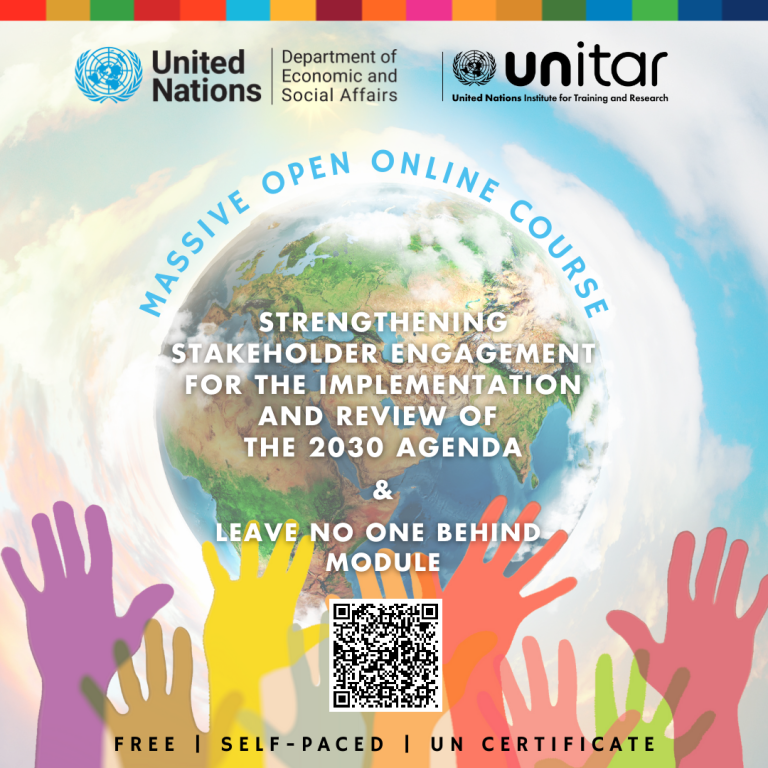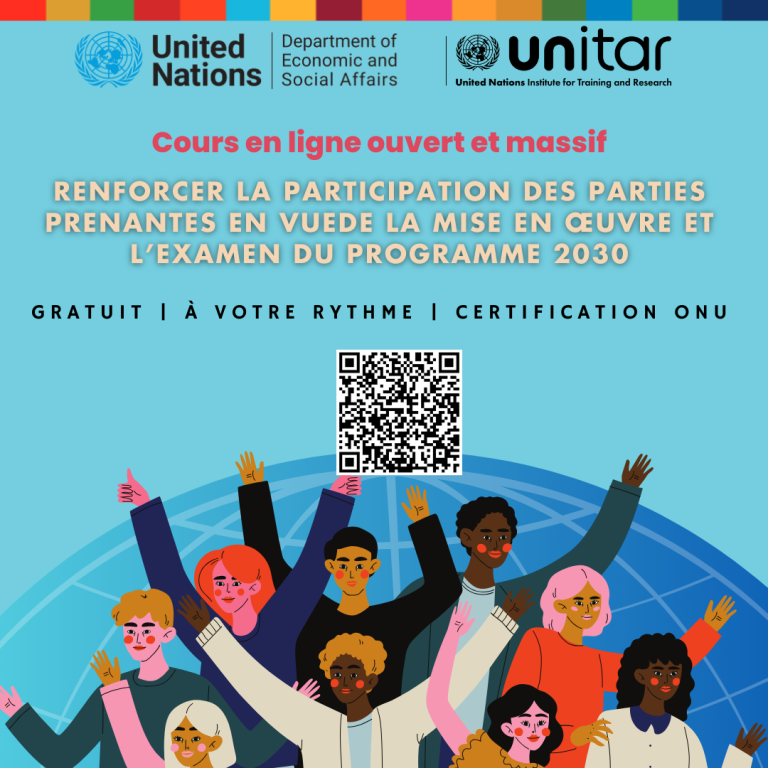Background
Overview
Developed by UNDESA/DSDG and UNITAR, this MOOC provides key information and tools on how to strengthen the engagement of stakeholders from different sectors and levels in the implementation and follow up of the 2030 Agenda and the Sustainable Development Goals (SDGs).
This open, self-paced and free course include detailed information on understanding the need for stakeholder engagement in the 2030 Agenda at the national level, learning about approaches and tools for strengthening stakeholder engagement for the SDGs and designing successful strategies for stakeholder engagement in national implementation and review processes for the 2030 Agenda.
The course has a special module focusing on “Leaving no one behind: Approaches, tools and best practices to promote meaningful engagement of all stakeholders in the implementation and follow up of the 2030 Agenda” . It explains the rationale of the Pledge to Leave No One Behind, identify tools to promote meaningful engagement of vulnerable stakeholders in the times of crisis, and concrete examples of how to carry out quality analysis of stakeholder engagement practices.
The course is open to governmental officials and other stakeholders such as UN staff, local governments, civil society and others. Completion certificates are provided to fundamental modules (3 modules) and individually for the LNOB module separately to all who qualify.
The course is available in English and French. LNOB module is currently available only in the English version.
Objectives
The learning objectives of the course are:
- To describe the rationale behind the need for Governments to engage with major groups and other stakeholders in formulating and reviewing SDG policies;
- To learn how to map key national stakeholders with a special focus on those who are the furthest behind;
- To assess the relevance of different models of engagement practiced by other countries as part of VNRs in their respective countries;
- To identify practical ways to engage with key national stakeholders, including vulnerable groups, in the context of preparations for VNRs;
- To develop long-term strategies for ensuring continuous stakeholder engagement as part of regular national review processes for the SDGs.
Structure
The MOOC is structured in four modules:
- Module 1. Understanding the need for stakeholder engagement in the 2030 Agenda at the national level
- Module 2. Learning about approaches and tools for strengthening stakeholder engagement for the SDGs
- Module 3. Designing successful strategies for stakeholder engagement in national implementation and review processes for Agenda 2030
- Module 4. Leaving no one behind: Approaches, tools and best practices to promote meaningful engagement of all stakeholders in the implementation and follow up of the 2030 Agenda (English Only)
New Module 4 on Leaving no one behind!
In response to expressed needs by course participants, Module 4 has been developed focusing on Leave No One Behind. This free and self-paced module is open to governmental officials and other stakeholders such as UN staff, local governments, civil society and others and can be undertaken together with the MOOC or separately.
Learning objectives
- Describe the rationale of the Pledge to Leave No One Behind and its main principles; and explain who gets left behind and why vulnerable groups should participate in the implementation and follow up of the 2030 Agenda at global, regional, and national levels.
- Utilize successful approaches and best practices tools to promote meaningful engagement of vulnerable stakeholders in the implementation and review processes for the 2030 Agenda, including in the COVID-19 response context.
- Assess the quality of engagement of stakeholders, including the most vulnerable in the national implementation and review processes for the 2030 Agenda.
Register now for the MOOC here:
EN: http://bit.ly/StakeholderEngagement-EN
FR: https://bit.ly/StakeholderEngagement-FRv
*Access is open*



